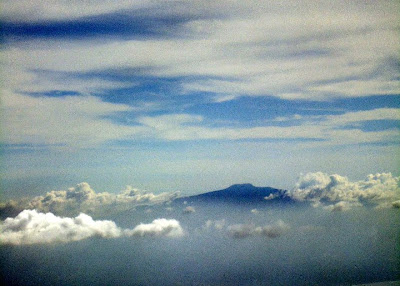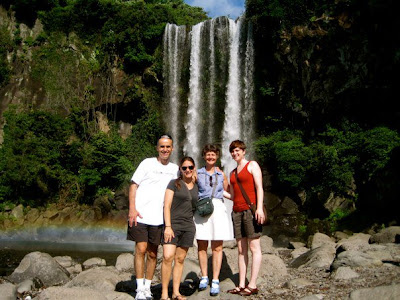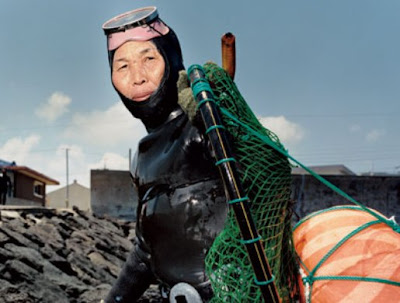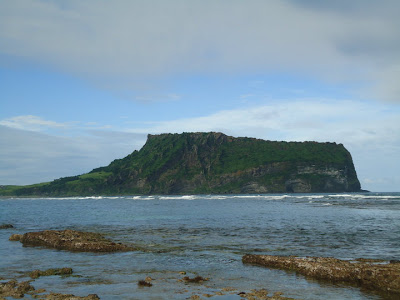Ever since we came to Korea Kerk and I have been in the habit of calling each other "Bookend," because live in the same building and thus have the privilege to bookend our days together. For summer vacation, Kerk's parents became our temporary Bookend Parents as we romped around Busan and then flew off to Jeju Island, "The Hawaii of Korea."

Mama Kerk took this picture of Mount Halla from the plane
When we got to the airport in Busan, everything was going smoothly until we went through security. Apparently, I had accidentally left a pair of small scissors in my cosmetic bag that I always have in my purse. After padding me down and murmuring some disapproval in Korean, they had me sign a paper. I have no clue what it said, but my name is now on a list with a bunch of other offenders! Oops!
On our plane ride to Jeju, the Stewardesses invited all the passengers to play a game of 'Kawi, Bawi, Bo' (Rock, Paper, Scissors) in order to win some prizes. We're not sure if this is a common phenomenon on all Korean domestic flights or if they felt unnecessarily guilty for our 10-minute delay in boarding (even though we ended up arriving in Jeju 5 minutes early), but either way, it was very amusing to play this child's game with 150 strangers!

When we landed 45 minutes later, our taxi driver was waiting for us. Bless his soul, he tried to write our welcome sign in English, and it read "Any Mansfield." It's very common that Koreans try to spell my name with a "Y" at the end, but we still couldn't help but crack some jokes about any person with the last name Mansfield being tempted to take our chauffer up on his offer.
My co-teacher, Sangmi, had arranged for him to take us on a scenic tour of the island before dropping us off at our hostel in Seogwipo, on the southern side of Jeju. The landscape was unlike any we had ever seen. Jeju was formed entirely from a volcanic explosion one million years ago, and the odd formations that resulted from it were astounding.

Here is one of the many random islands that you see everywhere, all of which claim to be "the top that blew off Mount Halla during the volcanic eruption" in the description of their legend.

Here are some "Dolharubang," or grandfather stone statues. You seem them everywhere, because there are several mountain sides with formations that look like an old man's face, so dolharubang are the protectors of the island.

Here are my favorite volcanic formations, the columnar joints, which arise from the contraction of molten lava during cooling, which splits the rock into polygonal columns.
When we arrived in Seogwipo, we were very pleased with the view of both the ocean and Mount Halla from our hostel rooftop.

We ate breakfast up here both mornings, and we stargazed and met new friends up here at night.
After getting settled in our room, we went for an evening walk across an interesting bridge. At night it lights up as a bunch of different colors, but we failed to take a picture of that

Then we crossed the bridge to a Jurassic Park-esque island:

After that, we followed a beautiful path

... to our first waterfall sighting! This is Cheonjiyeon Waterfall:

Here, soft sedimentary rocks formed 1 million years ago met a more resistant cap rock of volcanic lava flow (formed 400,000 years ago). Below this resistant shelf, the splashback into the softer rock stratum formed two plunge pools, one in front of the waterfall and one behind.
The following day, our taxi driver took us on an all-day scenic tour of the island. First we stopped at Jeongbang Waterfall:

The legend here is that a man named Seobul came to Jeju 2,000 years ago in search of an elixir of eternal life for Chin, the powerful emperor of China. After he failed to find it, he carved his name in the cliff and left.
We didn't find an elixir of life either, but I think that finding a rainbow in a 75-foot waterfall that meets the sea is pretty magical:

The next waterfall was called Cheonjeyeon (and yes, it took us awhile to realize that this was different from CheonJIyeon Waterfall, the one we saw the night before):

"Cheonjeyeon" translates to "God's Pool," and the legend is that the waiting maids of heavenly God stepped down a gorgeous viaduct to this pool, playing jade flutes and mandolins at midnight, safeguarded by stars for bathing.
After a morning filled with waterfalls, we went to the northwestern part of the island to Sanbangsan which literally means "mountain-room mountain." It is famous for the naturally-formed grotto in the side of the mountain which has been turned into a Buddhist shrine:

Our driver also took us to a beautiful temple on the sea, which may or may not have had the effect of making a certain Indiana girl want to give up Apple computers and shave her head in order to be able to stay here:





That afternoon, we swam at the beach and then retreated to our hostel, completely and wonderfully exhausted.
The next morning, we woke up fully refreshed, ready to climb part of Mount Halla. It takes 9 hours to climb the whole thing, so we insisted that lack of proper climbing gear was the only reason we didn't go that far ;-)
Here we are getting ready:

The trail:


Folding Screen rock

That afternoon, we visited Manjangeul, the lava tube cave. Like most caves, photos are forbidden, but I stole this picture from a website:

When you walk through it feels like you're inside a giant tube. It was formed when a rush of lave found a soft spot and went underground, much like a snake would. Here's a picture taken from inside the entrance:

It began raining immediately after leaving the caves, so we went to the Haenyeo Museum and learned about what has become my favorite story in Korean heritage.
The Haenyeo are women divers who have chosen their life's work to be diving into the sea to provide for their family and community. Because the volcanic island was infertile a long time ago, the Jeju inhabitants had to survive off the sea.

When a young girl decides to become Haenyeo, she joins the other Haenyeo in her community to learn from them. There are three levels of Haenyeo - first, second, and third class - depending on how deep you can dive and how far you can venture from the coast. Each Haenyeo has a sort of buoy that holds her findings - whether it be seaweed, abalone, or shells - which is attached to a rope that stretches down to the ocean floor so that she can keep her bearings. When she comes to the surface, she breathes out so forcefully that it sounds like a train whistle. Breathing out all the air allows her to intake a fuller breath as she prepares to dive back down. Some women can hold their breath up to three or four minutes!

After the women find what they need, they bring it to shore where the other women in their group have been burning fires to either boil water to sanitize their catch or to keep themselves warm in the colder seasons. During this time they sing and share stories about their ancestors, and the young girls learn about womanhood.
During the Japanese invasion, several Haenyeo combined forces to educate the Jeju inhabitants on how to fight and resist the invaders.
This tradition of free-diving (diving without special equipment, such as air tanks) has been carried on for over a thousand years, but is now sadly dying out due to advances in agriculture and fishing. The youngest Haenyeo is 30 years old.
This is the outfit they used to wear before modern wetsuits were invented:

That evening we arrived at our minbak (an inexpensive room with a kitchen), which was listed in the Lonely Planet guide as being "near Sunrise Peak mountain." What the guide failed to mention was that it was right smack dab up against the mountain itself. We had an amazing view of this crater mountain:

Here's a different view:

We were told that the best time to hike up Seongsan Ilchulbong was early in the morning to catch the sunrise:

It was a cloudy morning, so we couldn't see the sun very well, but we were proud of oursevles for waking up at 4:30am to be the first to get to the top! And the views of the crater and surrounding area were totally worth it.

Here's the crater with what looks like a patch of mowed grass in it. We passed the time waiting for the sun to rise by making jokes about the man who climbs up here with the lawn mower each week to mow this area so that his family has a nice place to picnic.


The rest of the time we were in Seongsan, our activities were a bit hampered by the typhoon, but we braved the weather a few times in order to catch a quick glimpse of the surrounding areas before finally admitting defeat and retreating to our minbak to watch movies and play cards.

We didn't, however, miss out on one of the island's famous dishes, abalone porridge:

But we did purposefully forego trying the other island specialty, black pig pork, after we found out why they're special: they're fed with human feces. This fact is apparently appealing to Koreans? I can't understand it, but it must be true because I found an entire street devoted to it in Jeju City:

All in all, we had a good experience with the culture of the island. Other mentionable foods were the infamous Jeju tangerines, which you could pretty much find on any street corner. Omija tea was also a big souvenir stand item. Aside from food, the most famous item to buy was a piece of clothing (or a purse or hat) that had been dyed with unripened persimmons. The islanders wear them when farming, but lately they've become stylish for visitors to the island. Mama Kerk bought a hat:

Here are some shirts being hung to dry after the dyeing process:

Now they are being made into more fashionable styles:

Our last day we had a nice walk around Jeju City, and then Mama and Papa Kerk got on a plane back home. It was definitely one of the best vacations I've ever had, and I hope I get the chance to return to Jeju one more time while I'm here. Who knows, maybe I'll even brave eating the black pork!
Until then, I'll cherish the memories of the beautiful places I saw and the beautiful people I saw them with. Thanks, Kerkians
 A hunchback you may be
A hunchback you may be I'm not eight
I'm not eight They have long hair
They have long hair Woe are Western thighs!
Woe are Western thighs! a hunchedback
a hunchedback

































































